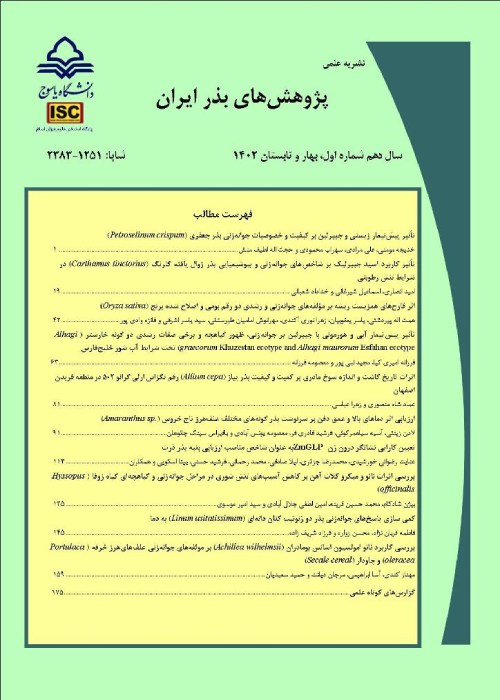Allelopathic Effects of Mustard (Sinapis arvensis) on Germination, Morphological and Biochemical Characteristics of Barley (Hordeum vulgare)
Author(s):
Article Type:
Research/Original Article (دارای رتبه معتبر)
Abstract:
Introduction
Crop rotations are practiced to eliminate the effect of monoculture, but the succeeding crop may be influenced by the phytotoxins released by the preceding crop. Among plants, Brassica species contain allelochemical compounds as glucosinolate that is, under special conditions, released to environment and affects seed germination and plant growth. Wild mustard (Sinapis arvensis L.) as a weed of 30 crops in 52 countries which has a series of allelopathic effects that prevent germination of other plants. Products of glucosinolate- like ionic thiocyanate (SCN-) inhibited the root or shoot growth of many crop species. Also volatile compounds like isoprenoid and benzenoid released from Brassica tissue degradation may suppress many crops growth. It was also found in many studies that allelochemicals, which inhibited the growth of some species at certain concentrations, might stimulate the growth of same or different species at lower concentrations. The present research was conducted to evaluate the effects of aqueous extract concentration of various mustard parts on barley seed germination and seedling growth.
Materials and Methods
In order to evaluate the allelopathic effect of mustard in agro ecosystems, a factorial experiment based on completely randomized design with three replications was carried out in botany laboratory of agriculture faculty, Illam University in 2014. Experimental treatments included five concentrations of mustards foliage and root aqueous extract (0, 10, 30, 50, and 70 percent) that were studied at germination and early growth stage of barley (cv. Abidar) in two separate experiments. In the seed germination section, the effects of aqueous extract of mustard on germination rate and germination percentage of barley seed were measured. In the study of the effect of aqueous extract of mustard on barley seedlings, weight and length of root and shoot, leaf chlorophyll content, proline and soluble sugars content were measured.
Results
Results showed that the highest amount of barley seed germination percentage and germination rate (100 and 19.5, respectively) were observed in control and the lowest amount (40 and 9.5, respectively) belonged to mustard root aqueous treatment with 70 percent concentration. The most decrease in barley seedlings length and weight were observed at the highest concentration of aqueous extract. The amount of chlorophyll a decreased from 2.39 in control to 1.66 mg per fresh weight in 70 percent concentration of aqueous extract treatment. The highest amount of proline (66.8 μM per fresh weight) in barley foliage was observed in 70 percent aqueous extract treatment. The results from this study showed that mustard allelopathic effect may be a possible mechanism controlling the barley germination and early growth stage in agro ecosystems.
Conclusion
Generally, we were able to demonstrate short term auto toxicity and possible short-term allelopathy due to mustard has harmful effects on barley including reduced seed germination and emergence of barley seedling. Depending on the concentrations of Mustard extract, allelopathic activity will vary Mustard. Further investigations are also needed to determine the influence of cultivar variations, and to identify the active compounds involved in mustard auto toxicity and Allelopathy. Highlights: 1-Mustards aqueous extract reduced seed germination percentage and plant growth in barley. 2-Mustards aqueous extract increased proline and soluble sugars in barley, but it reduced amount of chlorophyll in this plant.Keywords:
Language:
Persian
Published:
Iranian Journal of Seed Research, Volume:5 Issue: 2, 2019
Pages:
59 to 71
magiran.com/p1951775
دانلود و مطالعه متن این مقاله با یکی از روشهای زیر امکان پذیر است:
اشتراک شخصی
با عضویت و پرداخت آنلاین حق اشتراک یکساله به مبلغ 1,390,000ريال میتوانید 70 عنوان مطلب دانلود کنید!
اشتراک سازمانی
به کتابخانه دانشگاه یا محل کار خود پیشنهاد کنید تا اشتراک سازمانی این پایگاه را برای دسترسی نامحدود همه کاربران به متن مطالب تهیه نمایند!
توجه!
- حق عضویت دریافتی صرف حمایت از نشریات عضو و نگهداری، تکمیل و توسعه مگیران میشود.
- پرداخت حق اشتراک و دانلود مقالات اجازه بازنشر آن در سایر رسانههای چاپی و دیجیتال را به کاربر نمیدهد.
دسترسی سراسری کاربران دانشگاه پیام نور!
اعضای هیئت علمی و دانشجویان دانشگاه پیام نور در سراسر کشور، در صورت ثبت نام با ایمیل دانشگاهی، تا پایان فروردین ماه 1403 به مقالات سایت دسترسی خواهند داشت!
In order to view content subscription is required
Personal subscription
Subscribe magiran.com for 70 € euros via PayPal and download 70 articles during a year.
Organization subscription
Please contact us to subscribe your university or library for unlimited access!


